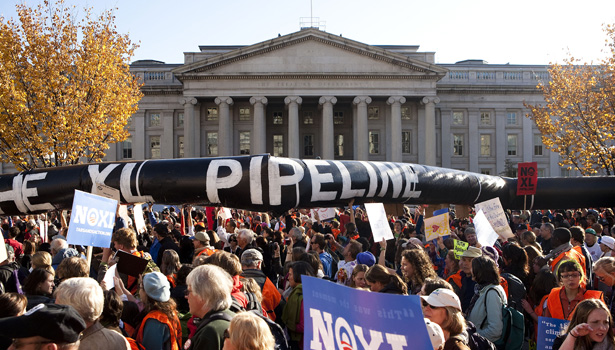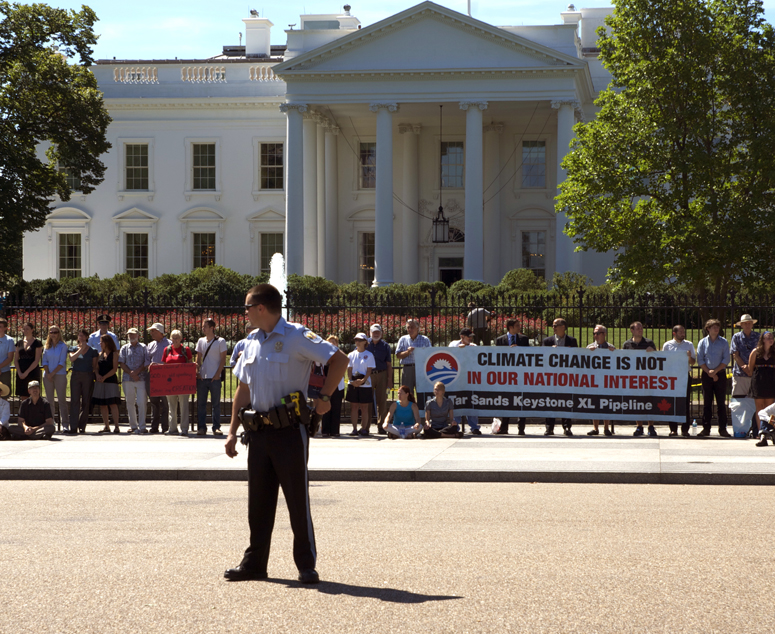The Keystone Pipeline Is No Victory for Environmentalism
At most, it's a symbolic victory. To ensure the end of tar sands oil, the government will have to enact measures make high-carbon fuel unprofitable.
And at most, it's merely a symbolic and short-lived win. To ensure the end of tar sands oil, the government will have to enact measures to make high-carbon fuel unprofitable.

Yesterday, everyone involved in the support and opposition to the Keystone XL pipeline got what they wanted: Obama tossed a squib to environmentalist supporters whom he's previously disappointed, and Republican boosters of the pipeline got to turn the Obama's refusal (which they accelerated by attaching a February 21 deadline for approval to the payroll tax bill) into a talking point against Obama in the upcoming election. In a country without a greenhouse gas strategy or an energy policy, this is passing for political action, but it's really... nothing, a draw, a symbol of symbols.
The Keystone XL is merely on hold, and oil from all sorts of other "dirty" situations continues to flow into our gas tanks. The next time around, environmentalists should resist fighting the symbolic pipeline to concentrate on fighting the larger issue -- reducing emissions and making tar-sands oils prices reflect their environmental toll. We need to stop fighting oil development project by project -- and instead focus on passing a Low Carbon Fuel Standard (which could make the Keystone XL economically unviable), and on reducing oil consumption overall.
First, I have to say I'm a skeptic about the economic viability of the Keystone XL pipeline. Tar sands oils are expensive to extract, so they require a high global oil price -- well over $50 a barrel to be profitable. In the global crude market, these oils do not command the higher prices that light sweet crudes do. So tar-sands crude operates within a pretty narrow margin of profitability. In addition, 15 companies, recently including Chiquita, and the EU are refusing to buy gasoline made with these oils -- which means that the stuff risks becoming an "orphan" crude, where only a few buyers compete for it. (The consulting firm Purvin & Gertz wrote a report suggesting that the Low Carbon Fuel Standard, which sets the tax on different fuels according to their total life-cycle emissions, would seriously impact the profitability of tar sands.)
When you put an oil with so many costs and qualifications into a $13 billion pipeline, you may magnify these price risks even further. Take the example of another TransCanada pipeline, the mainline gas pipeline running from Alberta to New England, which is now in a "death spiral" of rising costs and falling shipping volume. When less product is shipped in a pipeline, the cost per unit of product increases, making the product even more expensive. This, in turn, drives other suppliers out of the pipeline, making the product even more expensive. It's not hard to imagine this happening with the Keystone XL. It would join the dust heap of "must have" energy projects including LNG terminals, pipelines, and extra refineries that were sideswiped by market forces.
To stop tar sands development in Canada, we must work furiously to pass a low-carbon fuel standard. It is obviously a clunky bit of legislation, and it would need to be watched carefully and adjusted to account for how the market responds, but it's essentially fair. More importantly, it gets at the root of the problem with the oil sands -- their high, unpriced, environmental toll. Oil companies and Canadian Government have fought the Fuel Standard ferociously, but the legislation has the potential to create jobs, clean the air, and level the playing field for alternative fuels in the U.S. Environmentalists should put their resources into making a case to voters and pushing it hard.
More generally, I'm wary of big social movements taking on small-minded projects like opposing Keystone. The world is covered with pipelines built at the convenience of American companies with assistance from the State Department for the relative convenience of American consumers.
For the past 30 years, American environmentalists have concentrated stopping oil drilling off the east and west coasts, in the Arctic National Wildlife Refuge, and now in the tar-sands region. Over that time, until very recently, U.S. oil consumption has grown, so this activism has essentially off-shored our oil production to places like Angola, Chad, Nigeria, Ecuador, Kazakhstan, and Russia, among others -- places with far fewer environmental laws, human rights, and economic opportunities for citizens. (For the past four days Chevron has been battling what appears to be a serious offshore gas well blow-out in Nigeria. And yet coverage of the issue has been confined to the satellite fans, the drillers, and the sea captains .) Our desire to use oil that is not in our backyards, and preferably invisible, makes Saudi Arabia our perfect supplier: Its oil production is enormous and completely hidden from our view.
Even opposition to the high-carbon emissions of oil sands production bears a whiff of hypocrisy: Driving a mile in a conventional vehicle releases 377 grams of CO2, more than twice the amount of CO2 produced by refining that gasoline from tar sands (166 grams). The U.S. environmental community needs to become more broad-minded, more deeply moral, by changing strategies to really address the problem, which is that our use of oil is is despoiling lands, and producing greenhouse gasses that affect the whole world.
The Republicans made it easy for Obama to reject the Keystone XL this time around. Environmentalists of both parties should seize this moment by committing themselves to the much harder project of reducing worldwide oil consumption.


